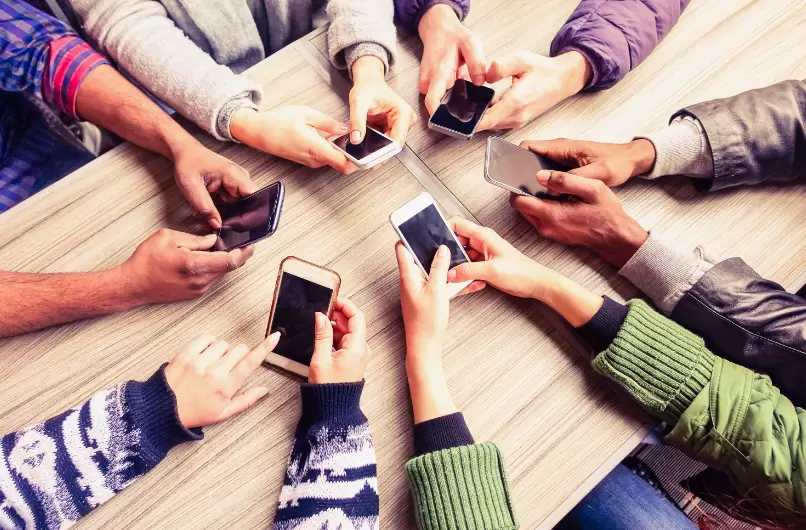Is Technology Killing Our Friendships? How Digital Distractions are Pulling us Apart
As smartphones have become omnipresent in daily life, constantly updating us on the latest moments from our expansive network of social connections, one question looms large are all these virtual relationships coming at the cost of our closest real world friendships?
While innovations in communication technology have undeniably opened doors to global networking at our fingertips, research increasingly suggests they may also be subtly undermining the quality interactions that nourish us emotionally. Let’s explore how digital devices could be impacting our most important offline bonds.
In a Hyper-Connected World, Why Do we Feel More Isolated Than Ever?
On the surface, with billions worldwide now just clicks away on Facebook, it seems modern mankind should experience less loneliness than ever before in history.
A never ending stream of notifications and updates keeps us wired in around the clock, so surely we must feel more socially engaged and connected as a result? Studies tell a contrasting tale.
In fact, self reported rates of loneliness and social isolation have been steadily increasing among Americans for decades, with the steepest rise occurring among young adults.
This paradox demands deeper examination. Although fostering never ending social media networks, studies find such interactions do little to curb loneliness at their core. Why? Because online relationships, while easy to maintain, lack the rich emotional fulfillment of quality face to face bonding.
A 2018 survey found that over half of millennials spent zero minutes with friends the previous day despite feeling lonely illustrating how virtual connections fail to satisfy humankind’s basic social psychological needs for empathy, support and companionship that truly satisfying relationships provide.
According to neuroscientists, in person communication allows reading subtle nonverbal cues like eye contact, facial expressions and tone of voice important for building empathy that text based mediums cannot.
The same study found loneliness actually increased on days people spent more time social media compared to meaningful social activities.
Could our preoccupation with broadcasting highlights to expansive audiences online ironically leave us feeling more isolated due to lack of deep dialogue? It seems constant connectivity comes at the cost of focusing on real interactions more capable of nourishment.
Social Media vs Real Socializing:
Steady exposure to curated highlights reels on Instagram and Facebook feeds conditions us towards shallow engagement as we effortlessly “like” and scroll through a barrage of positives without investing compassion.
As therapist Nora Kenworthy noted, “we’re socializing in bite sized, rapid fire forms versus longer, richer conversations.” Yet research finds the latter builds much closer relational well being that superficial likes and comments don’t match.
This notion aligns with studies finding meaningful communication allows empathy formation through contextual social cues.
Consider the stark contrast in Table 1 below that highlights shortcomings of online interactions for emotional bonding.
| Socializing Face-to-Face | Socializing Online |
| Allows true back and forth dialogue where both parties exchange perspectives versus one way content consumption | Interactions are often fleeting and fragmented as multiple conversations occur simultaneously |
| Integrates nonverbal forms of communication like eye contact and body language important for comprehension and closeness | Lacks nonverbal forms of communication which inhibits intimacy development |
| Facilitates deep self disclosure that strengthens relational well being versus superficial impressions management online | Enables breadth over depth through superficial likes, shares and cursory comments |
| Enables high quality bonding experiences pertinent to long term health whereas digital seldom satisfies core needs for compassionate support systems | Fosters shallow interactions that do not necessarily translate to true friendship or meet psychological needs for social thriving |
As the table shows, while virtual connections undoubtedly serve networking and light socializing needs, the deepest discussions nourishing relationships require face to face context allowing full empathy and vulnerability exchange lacking online.
Could disproportionate reliance on digital to facilitate even local relationships partially explain rising isolation?
Always Plugged In, But Tuned Out:
Aside from shifting where we socialize, constant smartphone use itself potentially fragments quality time with close companions.
Extensive research clearly shows habitual multitasking undermines concentration, learning and memory due to finite cognitive bandwidth.
Yet it’s virtually impossible to spend leisure time with friends today without a cacophony of alerts demanding attention.
The average American now checks their phone once every 12 minutes according to studies, and college students average 150 notifications daily few able to resist temptation to peek. This interrupts immersive enjoyment of experiences together and trains the brain towards constantly seeking external validation via virtual stimulation.
Worse, psychologists found friends who distractedly checked phones during conversations felt less empathy and closeness with each other afterwards.
Constant partial attention hinders emotional disclosure necessary for intimacy according to researchers like Sherry Turkle who warn we risk “emptied selves starving for the deep connections that technology cannot provide”.
This fragmented socializing leaves little room for uninterrupted discussion to cultivate trust through attentive listening so integral to meaningful friendships. So it is not good to say technology killing our friendship.
Is compulsive checking inhibiting our capacity to give others our undivided presence, a priceless gift that technology can’t replicate?
Making Time for What Really Matters:
Given these realizations about quality over quantity in relationships, experts argue proactively protecting offline bonds requires effort amid busy modern lives dependent on constant digital engagement.
Research confirms investing in truly present experiences together provides relief from daily stresses and forms indelible memories that nourish relational bonds for life.
From craft nights to sports games, shared activities facilitate real attentive conversation and bonding more fulfilling than perfunctory online check ins.
Studies even find going “offline” as couples through occasional technology fasts helps rekindle novelty and passion lost to distraction important to combat familiarity breeding contempt.
Spending time away from overwhelming information exchange allows reconnecting through simpler yet powerful traditions like handwritten letters, care packages or thoughtful phone calls that technology sometimes causes neglecting.
Quality over quantity proves key focusing on a select few and investing ourselves fully instead of superficial networking with many.
Some experts go as far as suggesting planned “distraction free” visits where phones are left at home or on airplane mode through meals, walks etcetera for optimal bonding.
Technology undoubtedly enhances possibility but moderation remains key unplugging permits deep nurturing humans require to thrive versus fleeting digital interactions alone. Finding equilibrium will serve both individuals and society best going forwards as connectivity evolves.
FAQ
Q. Do you think friendship have changed because of technology?
A. The meaning and dynamics of friendship have changed.
Q. Does social media hurt friendships?
A. Social media put a negative pressure on friendships.
Q. How can technology help friendships?
A. Teens can stay in constant touch with their friends through texts, social media and video calls.
Q. How do phones affect friendships?
A. We may be less present and attentive to our loved ones.
Q. Has technology changed people’s way of life?
A. Technology has changed the way we behave and operate.
Conclusion
Technology killing our friendship is not always true. Information exchange comes more effortlessly than ever through constant online accessibility, true relationship building develops slowly through quality face to face time requiring intention.
Research connects the dots indicating disproportionate focus on convenience and breadth of connections via phones risks neglecting depth so crucial for human happiness and well being.
As global connectivity evolves at lightning speed, protecting close personal bonds demands equal effort resisting overdependence on devices distracting from presence.
Making intentional space for whole hearted investment in a select core group through shared experiences away from virtual compulsions nourishes heart and soul more durably than ephemeral superficiality alone and by extension society overall.
Looking ahead, balance marrying both benefits will prove most fruitful as humanity walks handing hand with innovation.
When managed mindfully, technology holds tremendous potential for relationship enhancement it’s up to individuals seizing opportunities both virtual and real to foster true compassion beneath surface level interactions.













